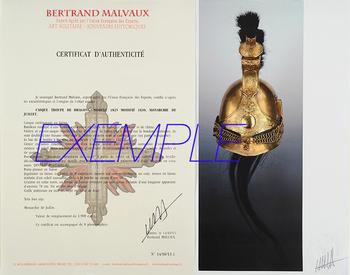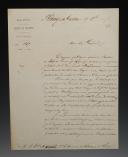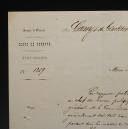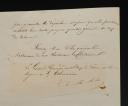
Army of the East. SIGNED LETTER FROM GENERAL MAC MAHON, commanding the reserve corps and the line of the Tchernaïa, TO GENERAL MORRIS, commanding the Division of the Chasseurs d'Afrique, Camp de Tracktir, October 1st, 1855. 18999-10
Sold out
Eastern Army. SIGNED LETTER FROM GENERAL MAC MAHON, commanding the reserve corps and the Tchernaïa line, TO GENERAL MORRIS, commanding the Division of the Chasseurs d'Afrique, Camp de Tracktir, October 1, 1855. 18999-10
Header "Eastern Army. RESERVE CORPS. STAFF - No. 1219".
General Mac Mahon expresses his concern to General Morris about the delays in the arrival of reports sent from Baïdar (Baydar) to his headquarters:
"Camp de Tracktir, October 1, 1855."
"...reports have been delayed, as I noticed, in their arrival, due to the orderlies who are tasked with carrying them from the post at the Kreutzenn bridge to my headquarters, not going directly to the latter destination but first passing through the general staff of your division, where they sometimes linger for a quite long time.
I kindly ask you to give orders so that the orderlies in question, in the event that, as I suppose, they have to deliver dispatches to you from Baïdar, only stop at your headquarters for the necessary time..."
Signed: The General Commanding the Reserve Corps and the Tchernaïa line: Mac Mahon.
Small rectangular black ink stamp: "Gal V". 1 and a half pages.
In good condition, crease marks, small tear with loss (without impact on the text).
BIOGRAPHY: General MORRIS.
Baron Louis-Michel Morris, born on September 27, 1803 in Canteleu (Seine-Maritime) and died in Mostaganem (Algeria) on June 7, 1867, was a French cavalry general.
Having risen to the rank of Captain in the 3rd regiment of the Chasseurs d'Afrique on December 18, 1832, he distinguished himself at the Battle of Merdès on September 12, 1833, was decorated the following November 14, had a horse killed under him before Bougie on July 23, 1834, particularly distinguished himself during the expedition to Constantine in 1836, and was mentioned in the army's dispatches.
HISTORICAL BACKGROUND: The Battle of the Tchernaïa River, also known as the Battle of the Tchernaïa River or the Battle of the Traktir Bridge, was a conflict that took place on the banks of the Tchernaïa River (meaning "black" in Russian) during the Crimean War on August 16, 1855 between Russia and a coalition of French and Sardinian troops.
The battle began with a Russian offensive aimed at ending the siege of Sevastopol. Two Russian army corps under the command of Prince Mikhail Gortschakov (58,000 soldiers) faced the Franco-Sardinian troops led by General Pélissier (36,000 men). Although witnesses of the battle were surprised by the courage of the Russian soldiers and the vigor of their attack, the Russian army's assault was poorly organized. Gortchakov had sent a note to his generals with the words "Let's begin," meaning they should start to deploy their forces, but the generals interpreted it as an order to attack and acted accordingly, encountering resistance from the French and Sardinians under General Alfonso La Marmora.
The bravery of the Sardinian and French soldiers from the 50th, 82nd, 95th, 97th line regiments; the 19th chasseurs à pied; and the 2nd and 3rd Zouave regiments was particularly noted. The battle ended in an allied victory.
The Russian losses were three times higher than those on the opposite side, although the allies lost the Sardinian general Montevecchio (Rodolfo Gabrielli di Montevecchio (it)). The Tsar's forces lost three generals.
The ineffective management of the battle became the subject of ridicule among its participants. This situation later inspired Léon Tolstoy to write a satirical song, his only known composition in verse.
In Turin, Via Cernaia commemorates this battle, and in Paris, Rue de Traktir does the same.
Header "Eastern Army. RESERVE CORPS. STAFF - No. 1219".
General Mac Mahon expresses his concern to General Morris about the delays in the arrival of reports sent from Baïdar (Baydar) to his headquarters:
"Camp de Tracktir, October 1, 1855."
"...reports have been delayed, as I noticed, in their arrival, due to the orderlies who are tasked with carrying them from the post at the Kreutzenn bridge to my headquarters, not going directly to the latter destination but first passing through the general staff of your division, where they sometimes linger for a quite long time.
I kindly ask you to give orders so that the orderlies in question, in the event that, as I suppose, they have to deliver dispatches to you from Baïdar, only stop at your headquarters for the necessary time..."
Signed: The General Commanding the Reserve Corps and the Tchernaïa line: Mac Mahon.
Small rectangular black ink stamp: "Gal V". 1 and a half pages.
In good condition, crease marks, small tear with loss (without impact on the text).
BIOGRAPHY: General MORRIS.
Baron Louis-Michel Morris, born on September 27, 1803 in Canteleu (Seine-Maritime) and died in Mostaganem (Algeria) on June 7, 1867, was a French cavalry general.
Having risen to the rank of Captain in the 3rd regiment of the Chasseurs d'Afrique on December 18, 1832, he distinguished himself at the Battle of Merdès on September 12, 1833, was decorated the following November 14, had a horse killed under him before Bougie on July 23, 1834, particularly distinguished himself during the expedition to Constantine in 1836, and was mentioned in the army's dispatches.
HISTORICAL BACKGROUND: The Battle of the Tchernaïa River, also known as the Battle of the Tchernaïa River or the Battle of the Traktir Bridge, was a conflict that took place on the banks of the Tchernaïa River (meaning "black" in Russian) during the Crimean War on August 16, 1855 between Russia and a coalition of French and Sardinian troops.
The battle began with a Russian offensive aimed at ending the siege of Sevastopol. Two Russian army corps under the command of Prince Mikhail Gortschakov (58,000 soldiers) faced the Franco-Sardinian troops led by General Pélissier (36,000 men). Although witnesses of the battle were surprised by the courage of the Russian soldiers and the vigor of their attack, the Russian army's assault was poorly organized. Gortchakov had sent a note to his generals with the words "Let's begin," meaning they should start to deploy their forces, but the generals interpreted it as an order to attack and acted accordingly, encountering resistance from the French and Sardinians under General Alfonso La Marmora.
The bravery of the Sardinian and French soldiers from the 50th, 82nd, 95th, 97th line regiments; the 19th chasseurs à pied; and the 2nd and 3rd Zouave regiments was particularly noted. The battle ended in an allied victory.
The Russian losses were three times higher than those on the opposite side, although the allies lost the Sardinian general Montevecchio (Rodolfo Gabrielli di Montevecchio (it)). The Tsar's forces lost three generals.
The ineffective management of the battle became the subject of ridicule among its participants. This situation later inspired Léon Tolstoy to write a satirical song, his only known composition in verse.
In Turin, Via Cernaia commemorates this battle, and in Paris, Rue de Traktir does the same.
Reference :
18999-10

Next update Friday, February 13 at 13:30 PM
FOR ALL PURCHASES, PAYMENT IN MULTIPLE CHECKS POSSIBLE
bertrand.malvaux@wanadoo.fr 06 07 75 74 63
SHIPPING COSTS
Shipping costs are calculated only once per order for one or more items, all shipments are sent via registered mail, as this is the only way to have proof of dispatch and receipt.
For parcels whose value cannot be insured by the Post, shipments are entrusted to DHL or Fedex with real value insured, the service is of high quality but the cost is higher.
RETURN POLICY
Items can be returned within 8 days of receipt. They must be returned by registered mail at the sender's expense, in their original packaging, and in their original condition.
AUTHENTICITY
The selection of items offered on this site allows me to guarantee the authenticity of each piece described here, all items offered are guaranteed to be period and authentic, unless otherwise noted or restricted in the description.
An authenticity certificate of the item including the description published on the site, the period, the sale price, accompanied by one or more color photographs is automatically provided for any item priced over 130 euros. Below this price, each certificate is charged 5 euros.
Only items sold by me are subject to an authenticity certificate, I do not provide any expert reports for items sold by third parties (colleagues or collectors).
FOR ALL PURCHASES, PAYMENT IN MULTIPLE CHECKS POSSIBLE
bertrand.malvaux@wanadoo.fr 06 07 75 74 63
An authenticity certificate of the item including the description published on the site, the period, the sale price, accompanied by one or more color photographs is automatically provided for any item priced over 130 euros. Below this price, each certificate is charged 5 euros.
Only items sold by me are subject to an authenticity certificate, I do not provide any expert reports for items sold by third parties (colleagues or collectors).


